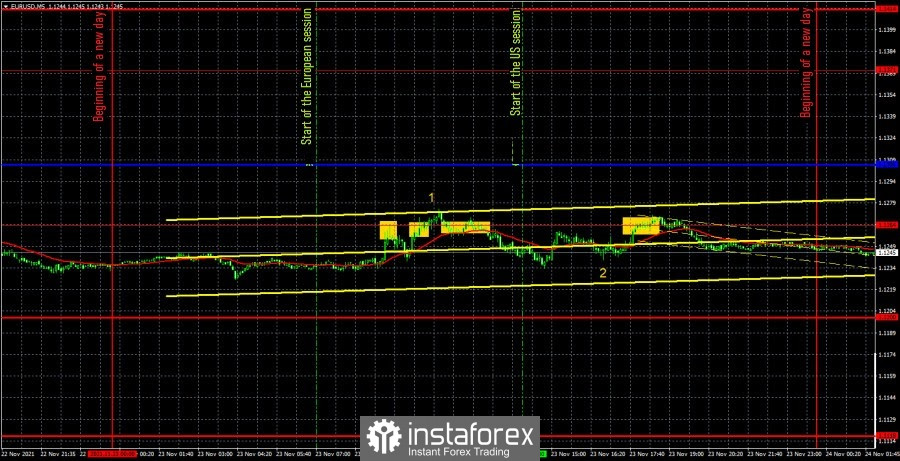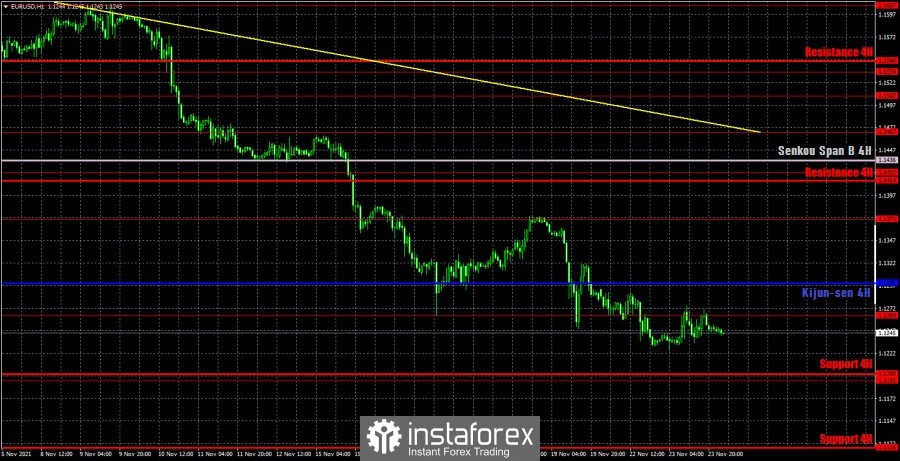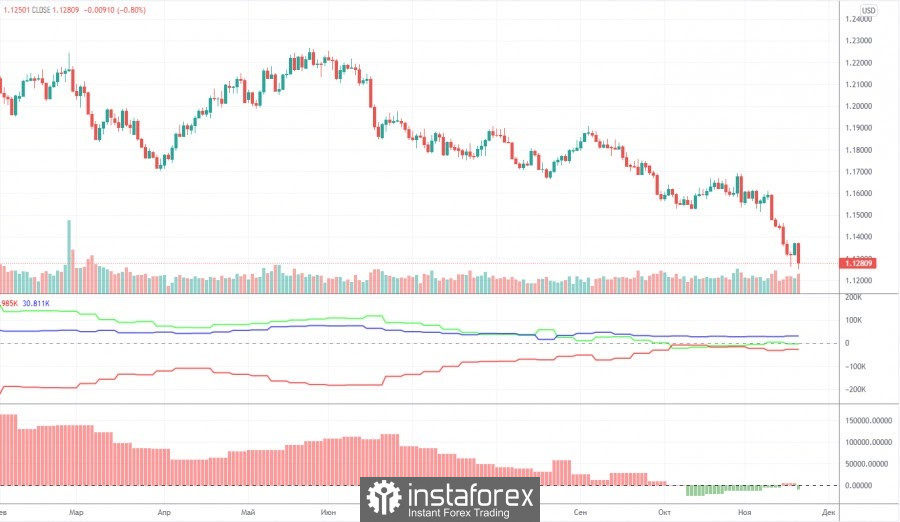EUR/USD 5M

The EUR/USD pair retained its downward trend again on Tuesday, although it would be very difficult to break it within one day if it formed over the past several weeks, at least. The pair moved mainly sideways throughout the day, as evidenced by both linear regression channels. Unfortunately, several false trading signals were generated as well. More precisely, all trading signals that were generated on Tuesday turned out to be false. But what else could be expected from the pair if its volatility was again around 50 points? It seems to be not very small, but provided there is no trend intraday movement, it is not enough. During the day, the European Union and the United States published business activity indices for the services and manufacturing sectors (the time of their publication is the numbers "1" and "2" in the chart). As you can see, there was no market reaction to these reports. However, the reports themselves are "to blame" for this, since they turned out to be as neutral as possible. Thus, all we have to do is to understand the trading signals and understand how we should have worked yesterday. The first signal - to sell - was formed upon a rebound from the level of 1.1264. After that, the pair managed to go down as much as 15 points, after which it returned to the level of 1.1264 and settled above it. Thus, a short position was closed by Stop Loss at breakeven, and traders had to immediately open long positions at a buy signal. However, the pair could not go up even 10 points, and after a few hours it settled back below the level of 1.1264. Thus, the second trade brought a loss to traders worth 12 points. All subsequent signals near the level of 1.1264 should not have been worked out for sure, since two whole signals had turned out to be false by that time.
EUR/USD 1H

The downward movement continues on the hourly timeframe, and the downward trend is beyond doubt, since the trend line remains relevant. The price continues to be far enough from this line, and the European currency still cannot adjust to it in any way. Thus, although the volatility is not too high this week, and the fundamental and macroeconomic background is practically absent, the euro cannot even begin a correction, so the chances of its fall remain high. We highlight the following levels for trading on Wednesday - 1.1192, 1.1264, 1.1371, 1.1422, as well as the Senkou Span B (1.1436) and Kijun-sen (1.1300) lines. The Ichimoku indicator lines can change their position during the day, which should be taken into account when looking for trading signals. Signals can be rebounds or breakthroughs of these levels and lines. Do not forget about placing a Stop Loss order at breakeven if the price moves 15 points in the right direction. This will protect you against possible losses if the signal turns out to be false. There will not be a single important event or publication in the European Union on November 24. But in the US, several important reports will be released at once, and in the evening the FOMC minutes will be published. Particular attention should be paid to reports on durable goods orders, GDP for the third quarter, as well as personal income and spending of Americans. Under certain circumstances, all of these reports can be easily ignored. But at the same time, the reaction to them can be quite strong, so you should not ignore them.
We recommend you to familiarize yourself:
Overview of the EUR/USD pair. November 24. European economy may need new stimulus... Coronavirus continues to rage
Overview of the GBP/USD pair. November 24. The British pound tried to perk up, but quickly wilted. Coronavirus is attacking Britain too
Forecast and trading signals for GBP/USD for November 24. Detailed analysis of the movement of the pair and trade deals.
Analysis of the COT report

The mood of non-commercial traders changed quite significantly during the last reporting week (November 9-15). A group of non-commercial traders opened 7,000 buy contracts (longs) and 20,500 sell contracts (shorts) during the week. Thus, the net position for professional traders decreased by 13,500, and the mood became more "bearish". It should be noted that the European currency has dropped quite seriously over the past few weeks. But the net position for the "non-commercial" group, starting from October, practically does not change. This is signaled by the green line of the first indicator in the chart above. Almost all this time, it has been near the zero level, indicating the absence of serious changes in the mood of major players. Thus, if the general trend remains the same - over the past ten months, large players have seriously reduced the number of longs and increased the number of shorts, then in the past few weeks nothing of the kind has been observed, and the European currency was still falling. This suggests that what is happening on the market now does not quite correspond to the actions of large players. The second indicator (the net position for professional traders in the form of a histogram) shows that in the last six weeks the mood of traders has become less bearish, that is, in theory, at this time the euro should have been growing, not falling. Thus, if we draw a conclusion only on the basis of the Commitment of Traders (COT) reports, then a further fall in the euro currency is completely unclear.
Explanations for the chart:
Support and Resistance Levels are the levels that serve as targets when buying or selling the pair. You can place Take Profit near these levels.
Kijun-sen and Senkou Span B lines are lines of the Ichimoku indicator transferred to the hourly timeframe from the 4-hour one.
Support and resistance areas are areas from which the price has repeatedly rebounded off.
Yellow lines are trend lines, trend channels and any other technical patterns.
Indicator 1 on the COT charts is the size of the net position of each category of traders.
Indicator 2 on the COT charts is the size of the net position for the non-commercial group.
 English
English 
 Русский
Русский Bahasa Indonesia
Bahasa Indonesia Bahasa Malay
Bahasa Malay ไทย
ไทย Español
Español Deutsch
Deutsch Български
Български Français
Français Tiếng Việt
Tiếng Việt 中文
中文 বাংলা
বাংলা हिन्दी
हिन्दी Čeština
Čeština Українська
Українська Română
Română

